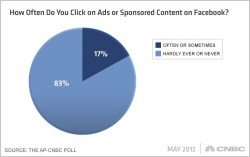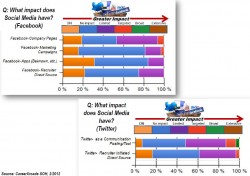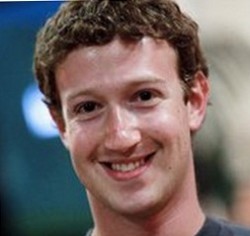![]() As the investment world watches Facebook’s historic IPO today, marketers are beginning to wonder if advertising on the 900-million-member social network is going to yield anything close to the bonanza of its initial stock offering.
As the investment world watches Facebook’s historic IPO today, marketers are beginning to wonder if advertising on the 900-million-member social network is going to yield anything close to the bonanza of its initial stock offering.
Just this week, General Motors confirmed it was cancelling $10 million worth of ads on the site because, said the Wall Street Journal, it found they “had little impact on consumers.”
The article arrived like a bombshell, coming just days before the IPO. It set off all sorts of debate in the marketing community — and beyond, of course — as experts weighed in on both sides. Rival carmaker Ford even jumped in, firing a shot on Twitter saying, “It’s all about the execution. Our Facebook ads are effective when strategically combined with engaging content & innovation.” Remember that part about “engaging content & innovation.”
For recruiters, this is more than just an interesting sidebar to the stock sale story; which, is opening (but won’t stay) at $38 a share, giving Facebook a market value of $108 billion. Rather, the General Motors withdrawal raises anew the whole issue of the effectiveness of social media recruiting, and Facebook specifically.
There’s even doubt Facebook has staying power. An AP-CNBC poll found 46 percent of respondents believe the site will fade away over time, replaced by something else. (43 percent believe it will survive.) Surprisingly, among its young adult users, while 51 percent say it will stay around, 35 percent say it won’t.)
Whatever its fate, social media as a whole has been embraced by the recruiting industry in a way that’s entirely out of proportion to what it gives back. Every survey I’ve seen on source of hire puts social media so far down the pecking order that it neighbors with print, career fairs, and walk-ins. That is, assuming the survey got that detailed.
(I know there is plenty of disagreement over the entire “source of hire” metric. Chris Brabic at Smashfly quotes Master Burnett on the subject, and CareerXroads this year chose to title its annual study, “Sources of Hire: Channels That Influence.“)
Other surveys, less subject to the hand-wringing uncertainty of where a hire came from, show Facebook produces less of the results marketers care about than does Google or, for that matter, the Internet generally. Based on some 11,000 campaigns, Webtrends found Facebook’s click-through rate for banner ads to be .051 percent, half the industry average of .1 percent and way less than Google’s display network average .4 percent.
 The AP-CNBC poll found 57 percent of users never click on a Facebook ad.
The AP-CNBC poll found 57 percent of users never click on a Facebook ad.
Employers haven’t much experimented with banner ads on Facebook, though they have spent on SEO and Google’s AdWords. An average click-through rate for an AdWords campaign is about 2 percent. Some rates can be considerably higher, depending on position and subject.
Recruiters who put at least some marketing dollars into improving their position on search engine results pages (SERP) can expect to get the highest click through rates of all. Slingshot, an SEO company, says getting the top position on a Google SERP gets you a click through rate averaging 18.2 percent.
What this says is that in a choice between spending on ad campaigns and search engine positioning, go with the SEO (search engine optimization).
But getting to the heart of the matter, Facebook at this time just isn’t delivering. It’s heresy, especially on a day when the social network is making millionaires out of many and billionaires out of a few. However, the reality is that the number of hires sourced directly from Facebook is all but negligible for most companies. (As they say in the car ads, your mileage may vary.)
The CareerXroads survey, this year asked the recruiting leaders of a few dozen major companies — companies that typically have the resources to manage a significant social media presence — what impact Facebook, Twitter, LinkedIn, and social media sites generally have on their recruiting.
 The short answer is: not much, when it comes to Facebook and Twitter. In fact, Twitter actually fared better than Facebook for direct sourcing. The full results in the accompanying charts plainly show that with the exception of the company profiles, Facebook otherwise doesn’t deliver a whole lot.
The short answer is: not much, when it comes to Facebook and Twitter. In fact, Twitter actually fared better than Facebook for direct sourcing. The full results in the accompanying charts plainly show that with the exception of the company profiles, Facebook otherwise doesn’t deliver a whole lot.
LinkedIn, which I maintain is a job board dressed up for a social, did, on the other hand, have an impact; an especially significant one when recruiters used it to source candidates by searching the profiles.
The only other high value social activities were search engine optimization and marketing. That fairly confirms what the click through surveys show.
Before moving on from this, one more stat from the CareerXroads study is worth noting: 20.1 percent of the external hires came from job boards. Only referrals yielded more.
If that doesn’t make you wonder about your priorities, I suggest it should. Silkroad, which surveyed the data from 700 of its ATS customers, confirmed what CareerXroads found, and said the fremium board, Indeed.com, was the best at sourcing external hires.
Not for one minute am I suggesting you abandon your social media presence. You should be there because you are expected to be there by the next generation of your workforce. And social media is an ideal way of building a community of interested potentials, and developing or reinforcing a brand.
The problem I see is that too many employers and recruiters think a social media strategy consists of tossing up a company profile that reads like something from an annual report, and then posting jobs.
Those of you squirming uncomfortably right now, I am talking about you. The essence of social media is conversation, not distribution. Conversation is two way, and it includes things we would rather not hear, as well useful information we share with our friends, fans, members, or audience.
Treat Facebook that way, and you won’t be disappointed that it isn’t a stronger source of hire. At least stronger in the sense that you can directly measure its impact.
However, with a limited marketing budget, Facebook would not be where I’d make a big play. The data says employee referrals and job boards yield better results. The company career site, as dismal as so many are, warrants a much bigger investment than many companies make. A PotentialPark report says even college students about to enter the workforce go there for information about the company. To make it easier to find and improve its position on search engine results pages, spend on optimizing the site.

And connect it all up with your social media presence, which, by now, you know needs personal contact.
It’s interesting to note that years ago, founder Mark Zuckerberg suspected Facebook might eventually be a recruiting tool. In an email in 2004, an irritated Zuckerberg blasted co-founder Eduardo Saverin for launching a job board and running ads for it on the fledgling Facebook:
You developed Joboozle knowing that at some point Facebook would probably want to do something with jobs. This was pretty surprising to us, because you basically made something on the side that will end up competing with Facebook and that’s pretty bad by itself. But putting ads up on Facebook to advertise it, especially for free, is just mean.
Mean? Who knows. Ineffective, looks like it.